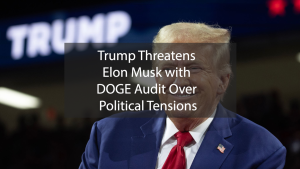
Crypto and Politics: How the Election is Shaping Public Perception of Blockchain
In recent years, blockchain technology and cryptocurrency have moved beyond the fringes of finance and tech to enter the mainstream political discourse. The 2024 U.S. presidential election has only intensified this trend, with political figures increasingly addressing blockchain’s potential as a decentralized, transparent, and secure solution for governance. But what’s driving this interest? And how might the election shape public perception and future adoption of blockchain?
Let’s dive into how political dynamics, bipartisan interest, and high-profile endorsements are influencing the way the public sees blockchain, and how this technology could play a pivotal role in future elections.
1. Political Interest in Decentralization
In a polarized political climate, the appeal of decentralized, censorship-resistant technology has become more pronounced. Blockchain, with its core principles of transparency, security, and autonomy, presents a solution to some of the political system’s most criticized aspects.
- Growing Distrust in Centralized Authorities: Increasing numbers of Americans are skeptical of centralized institutions—whether it’s government agencies, tech companies, or even the traditional banking system. Blockchain’s decentralized nature provides an alternative where power and control are distributed rather than concentrated, reducing the potential for abuse or corruption.
- A Technology for All Sides: As political tensions continue to rise, both sides of the political spectrum are beginning to see the value in blockchain technology. For conservatives, blockchain represents freedom from government oversight and censorship. For liberals, it’s a tool for transparency and accountability, especially in areas like campaign finance and public spending.
The decentralized ethos of blockchain aligns with the American values of autonomy and freedom, making it a technology that can resonate with voters across party lines.
2. Crypto as a Non-Partisan Solution
One of the most surprising trends in recent years has been the bipartisan interest in crypto and blockchain technology. While political divisions are stark on most issues, crypto appears to be one area where both Democrats and Republicans can find common ground.
- Transparency in Governance: Blockchain’s promise of an immutable ledger makes it an ideal technology for transparent governance. Governments can use blockchain to create transparent records of financial transactions, supply chains, and public spending—offering a level of visibility that’s hard to achieve with traditional systems. Both sides of the aisle recognize the appeal of such transparency as a way to rebuild public trust in government.
- Secure and Fair Elections: There’s a growing consensus that blockchain could be the answer to secure and tamper-proof voting systems. With concerns about election interference, gerrymandering, and voter suppression, blockchain-based voting could ensure every vote is counted fairly and transparently. A secure, blockchain-based system could provide a non-partisan way to improve election integrity, which is in everyone’s interest regardless of party affiliation.
- Financial Inclusion: Crypto is often touted as a means of democratizing finance by offering financial services to the unbanked and underbanked. This potential for financial inclusion is increasingly recognized by both parties as a non-partisan issue, especially as more people look for alternatives to traditional banking.
In an era where partisanship is the norm, blockchain’s ability to address issues on both sides of the aisle could be crucial for its continued acceptance and adoption.
3. High-Profile Endorsements from Political Figures
The mainstreaming of blockchain technology in the U.S. political landscape has been further accelerated by endorsements from prominent political figures. Their support brings credibility and visibility to the technology, influencing public perception.
- Donald Trump’s Pragmatic Approach: While Trump was once skeptical about cryptocurrency, his administration in 2017-2021 witnessed the rise of Bitcoin as a prominent asset. In his current campaign, he’s shown more openness to blockchain’s utility as an economic asset, particularly as a hedge against inflation and a means of increasing America’s competitive edge.
- Kamala Harris’s Focus on Inclusion and Transparency: As Vice President, Kamala Harris has been vocal about the importance of inclusive economic policies. Her administration has shown interest in blockchain for enhancing transparency and promoting financial inclusivity, aligning with her party’s focus on equitable access to financial resources.
- Other Notable Advocates: Figures like Senator Cynthia Lummis, a Republican from Wyoming, and Senator Kirsten Gillibrand, a Democrat from New York, have proposed bipartisan legislation to create clear regulatory frameworks for crypto. Their support underscores that blockchain is not just a fringe tech, but a legitimate innovation with bipartisan appeal.
With political heavyweights backing crypto and blockchain, public perception shifts from seeing it as a speculative or niche technology to recognizing it as a serious tool with real-world applications.
4. Potential for Crypto to Shape Future Elections
The use of blockchain technology in the electoral process may be closer than we think. As both political and public interest in secure and transparent voting systems grows, blockchain could redefine how we conduct elections in the future.
- Blockchain-Based Voting Systems: Blockchain could enable secure, verifiable, and transparent voting. Each vote would be recorded on an immutable ledger, ensuring it can’t be tampered with, and could be publicly audited while maintaining voter privacy. This kind of system could increase voter confidence, reduce fraud, and streamline the counting process.
- Combatting Disinformation: Blockchain could also be used to verify the authenticity of information, particularly in political campaigns. With deepfake videos and misinformation on the rise, blockchain could serve as a tool for ensuring that campaign messages and media are authentic, preserving the integrity of the democratic process.
- Funding Transparency in Political Campaigns: By using blockchain to record campaign donations, it becomes much easier to track and verify where funds are coming from and how they are spent. This would provide voters with more transparency, enabling them to make informed decisions at the polls.
The possibility of blockchain-based voting and campaign financing tools isn’t just an abstract concept; it could be the future of democratic governance, making elections more secure and accessible.
Conclusion
As the 2024 U.S. election unfolds, it’s clear that blockchain is no longer a technology confined to cryptocurrency enthusiasts and tech circles. Political leaders from both sides recognize its potential to address issues ranging from governance transparency to election integrity. With high-profile endorsements, growing bipartisan interest, and real-world applications on the horizon, blockchain technology is increasingly seen as a non-partisan solution to some of America’s most pressing issues.
As more people recognize blockchain’s potential, public perception continues to evolve from skepticism to curiosity—and now, to serious consideration. The next few years could be pivotal, not only for crypto as a financial asset but for blockchain as an indispensable tool in the realms of governance, elections, and societal trust. If the current political momentum continues, blockchain could play a defining role in shaping not just the future of finance, but the future of democracy itself.
In a time of political division, blockchain may be the unifying technology we need—a decentralized, transparent, and secure tool that appeals to both sides of the aisle. For voters and investors alike, the fusion of crypto and politics signals exciting possibilities for the future.
















